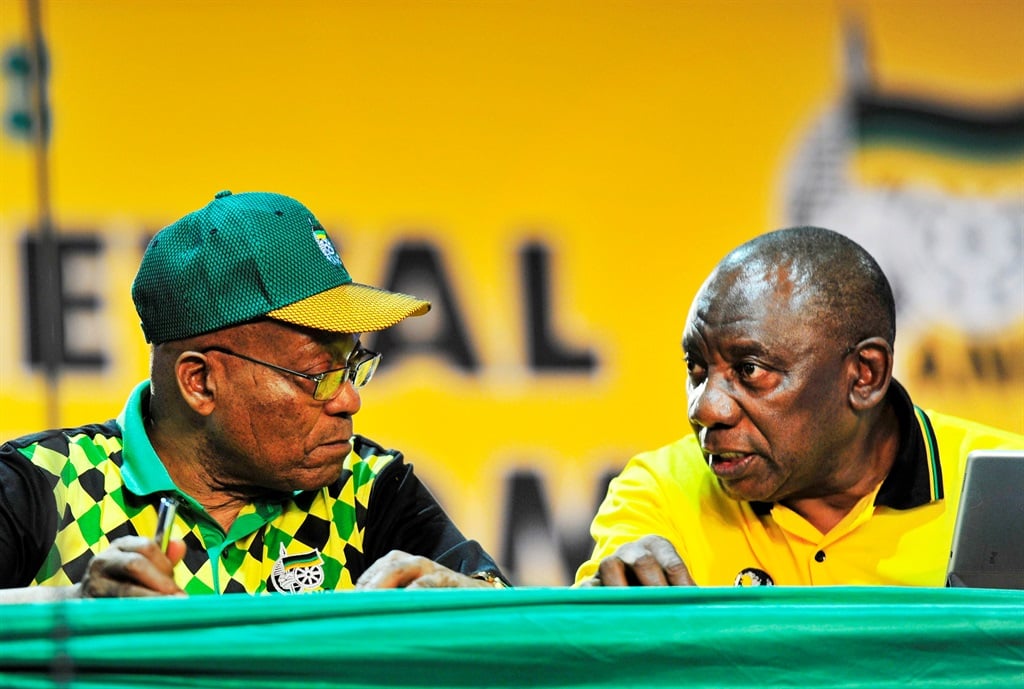
A decade ago, South Africa deftly negotiated the global financial crisis thanks to good governance and effective decision-making. But the spread of Covid-19 has exposed the country, and sees the convergence of three major crises for President Cyril Ramaphosa, writes Pieter du Toit.
In February 2009, a year after the global financial crisis hit, Lesetja Kganyago - now the governor of the SA Reserve Bank and then director-general of National Treasury - wrote in the annual Budget Review that government can cushion the blow of the worldwide conflagration by increasing spending.
That is, Kganyago said at the time, because "tough decisions taken more than a decade ago are now bearing fruit".
In fact, not only could government increase spending on a range of crucial social programmes, it could help state-owned enterprises - like Eskom and SAA - finance their capital investments and invest in education and rural development.
"This is an expansionary budget," he said of that year's national budget.
A little more than a decade later and President Cyril Ramaphosa is facing the convergence of three major crises without anything close to the level of firepower Kgalema Motlanthe, who was caretaker president in February 2009, could call upon. “Covid-19 found us on our knees,” a former senior civil servant, who had direct line-of-sight into South Africa’s national accounts for two decades, said this week.
Ramaphosa is facing an unfolding global health catastrophe - fast developing into an economic one - with a brittle economy and a depleted (actually, plundered) fiscus and an inefficient, incapable state.
Covid-19, South Africa’s economic position and the weak state is combining to create an almost unspeakable mess for the president.
While Ramaphosa’s reaction to the novel coronavirus has been pro-active and decisive, the rate of infection must still reach its peak, and the measures implemented by the government has meant willful damage was done to an already ailing economy.
And when the Covid-19 virus hits with full velocity, as it has done in China, Italy and the United States, South Africa’s public and private health system stands to be overwhelmed.
A senior civil servant, with more than 20 years' experience in the democratic state, says eight years of looting - under the government of Jacob Zuma - and two years of mediocre leadership since has left the country "with nothing".
The state, he says, "is broken".
In 2008 South Africa had been running two successive years of budget surpluses and the GDP growth rate was reaching 5%. Foreign debt was small.
There was fiscal space.
In 2020 there's nothing of the sort - GDP growth has literally ground to a halt, unemployment has hit record highs, the currency has hit record lows (it has now shed 20% of its value in the last month), government debt is spiralling out of control, expenditure is unsustainable, and revenues are down.
The civil servant, who has survived the worst of the state capture era, didn’t mince his words.
"Government is broken ... and if you do bad things, like we saw under Zuma, you close down fiscal space. And even if you are prepared for something like this virus, it's still fucking hard. This thing will make 2009 look like a picnic."
Warning signs everywhere
Writing in British magazine The Spectator on Thursday, former Financial Times editor Lionel Barber said the world as we have known it has come to a stop.
"We have a supply chain crisis, a demand crisis, a labour market crisis and an oil price crisis.
"Emerging markets have been left dreadfully exposed. Brazil, Mexico and South Africa, among other developing countries, are under pressure from capital outflows as the dollar has strengthened, commodity exports fall in value and the easy money of the past decade takes flight. These countries will have to go cap-in-hand to the IMF for dollar liquidity or secure swap lines from the Fed."
Adam Tooze, a professor of history at Columbia University in the US, writes in the journal Foreign Policy that the coronavirus is the biggest health and economic crisis developing countries have ever seen.
"At the head of the list of vulnerable countries is South Africa. The virus count is heading rapidly towards a tipping point. Its health system is stretched at the best of times with a population of 7.7 million living with HIV. A lockdown has been declared. The military has been called out. Meanwhile the rand is collapsing, and South Africa’s foreign debt has been cut by the ratings agencies to junk status."
The Zuma years were expensive and has left South Africa exposed and severely weakened.
And where Kganyago stated the country could, in 2009, pick the fruits of difficult decisions taken a decade before, South Africa is now reaping the bitter harvest of mismanagement and corruption.
Explains Goolam Ballim, chief economist at Standard Bank: "Our trend rate of economic growth plunged from near 4% in 2008 to about 1% last year. One can ascribe about 55% of the degradation in potential GDP growth, in the last decade, to the dysfunction in the political and policy environment. About 45% could be ascribed to the 2008-'09 global financial crisis."
The warnings have always been there.
The civil servants News24 spoke to - both current and former - agree that the Zuma years have all but destroyed South Africa’s ability to withstand current shocks.
The serving official says fiscal management under Zuma "got worse and worse" every year, while the former official says spending under him ballooned.
National Treasury, for its part, issued the same dire warnings about where the country was headed almost every six months.
In February 2016, two months after Zuma's most audacious intervention on behalf of the state capture buccaneers, when he dismissed Nhlanhla Nene as finance minister, Treasury pleaded with government to restore trust in the system.
"In recent months, perceptions of risk associated with lending or investing in South Africa have inceased," it said diplomatically.
"Deterioration in the credit-rating outlook towards the end of 2015 was followed by changes in the finance portfolio, catching investors off-guard and raising concerns about fiscal probity."
And it was fiscal probity which all but went out of the window under Zuma's leadership.
The former civil servant says under Zuma the composition of government spending quickly changed and reconfigured in favour of increased wages for public servants.
Efforts to contain spending under Zuma succeeded to a degree because Treasury was able to by and large keep the expenditure ceiling intact. But spending was redirected from other programmes to accommodate increased remuneration for public servants.
And while the Zuma government’s spending patterns changed, it neglected to grow the economy and allowed a culture of corruption and impunity to flourish.
Billions of rands were channeled to state companies like Eskom and SAA, never to be seen again.
"After the global financial crisis, we were able to apply a range of fiscal and monetary measures to mitigate the impact of the crunch. We had money available to inject into the system, we could significantly reduce interest rates to stimulate the economy and we could start running a budget deficit.
"Why could we do that? Because the political system had credibility. There was an understanding that the same people that took us to run consecutive budget surpluses were the same people that now allowed a deficit to widen. That's not the same today. The political system doesn’t have credibility anymore," says the former civil servant, who used to be one of the most senior officials in government.
Michael Sachs, who until recently headed the budget office at Treasury, says although the spread of Covid-19 couldn't have been foreseen, the blow should have been softened.
"Maybe if Treasury were listened to, we would have been able to handle this and other shocks better."
Pravin Gordhan, whose first stint as finance minister was between June 2009 and June 2014, says strong GDP growth, growing revenue and a budget surplus helped the country through the financial crisis.
"We thought we would quickly return to 3% growth. We did for a short period. But growth has been low since then. This was compounded by the era of state capture."
What to do now
Sachs says Covid-19 will accelerate structural reforms.
"We could have gone on for another ten years like this, and Ramaphosa probably had time. But now we don’t have space and we don’t have time anymore."
The government should do everything in its power to address the oncoming health crisis, should prepare for the worst and should not be constrained by the lack of money.
"It must aggressively pursue lines of credit with the World Bank, International Monetary Fund and China. We should focus on making sure the three-week lockdown succeeds, save lives and protect the economy."
This was echoed by Harvard University economist (and adviser to government) Professor Ricardo Haussman, who earlier this week advised developing nations that now is not the time to "worry about prudential norms" like debt or ratings agencies.
"Mobilise the maximum amount of fiscal resources you can get your hands on so you can fight Covid-19 and help people cope with it."
The crisis with Covid-19 is enveloping everything.
The global order has been shaken, with the United States battling to come to grips with the disease, the financial system being tested, and an economic depression looming.
Locally South Africa's whole way of life is under threat.
With half the country living in poverty there is potential for a humanitarian crisis if the informal economy, on which a significant part of the population relies, collapses.
"The downgrade by Moody's is bad, yes, but this virus just drowns out everything. We’re living in an abnormal world, nobody knows where this is going to end, where the bottom is. Not the markets, no one what’s going to happen. This is going to change the world," says the serving government official, who is intimately involved in crisis planning.
"Our GDP is going to drop, whether it's by 5% or more, we don’t know yet. But it's going to be big. Our only option is containment, we have to prevent hunger and alleviate poverty."
Gordhan, now Minister of Public Enterprises, says the country is lucky to have "Ramaphosa’s strong leadership" and that government will "rally its resources the best it can".
"But we’re not without options, and we’re not without hope," he adds.
In 2009 South Africa could rely on reserves, resources and resilience.
In 2020 resilience is all that is left.




 Publications
Publications
 Partners
Partners























